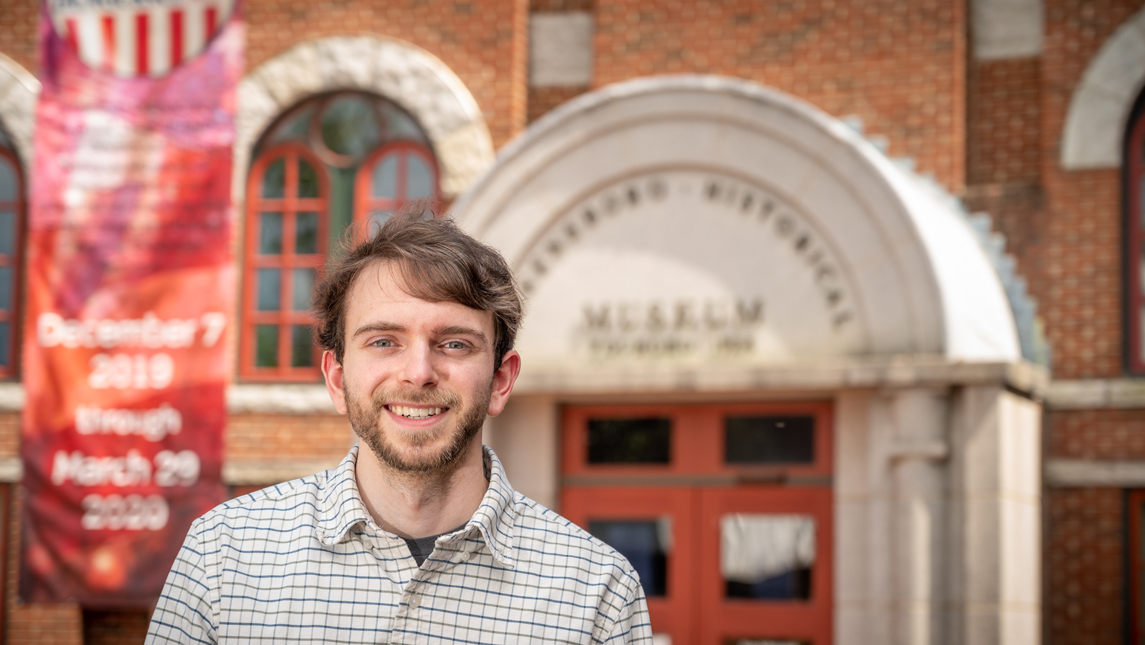
For graduating master’s student Kyle Booker, the study of public history and historical resources is both looking back and looking forward.
“Figuring out who we used to be was a really big deal to me,” he says. History has been transformative for him, in growing personally, in connecting him with people and their legacies, and in showing him how he can be a part of community growth.
Booker grew up in western North Carolina, in Asheville, where he visited the Biltmore Estate at least once a year. His father led tours on occasion and as a family they not only marveled at the majesty of the grounds and buildings but also contemplated the difficult moments in the history of the estate.
After earning his BA in history from N.C. State in 2017, he came to UNC Greensboro with the end goal of working at a museum and in public history. His plan is to find a position that involves creating educational programs, leading tours, and creating North Carolina history events that are relevant to local communities.
Now, having just completed UNC Greensboro’s program in Museum Studies, one of two master’s concentrations in the Department of History, he has had extensive opportunities to engage in hands-on historical research and public history dissemination.
“It’s not only talking about the theories, but really go-and-do, which was invaluable. Our program has given me a lot of tools – a great diversity of skills that I really want to put into practice.”
During his first year in the program, he assisted with an exhibition and event focused on Greensboro’s former polio hospital. In his second and final year, in collaboration with his cohort of fellow students in the Public History program, he led tours and created a video for the program’s presentation of “Patient No More.” The traveling exhibition, stationed in Greensboro at the International Civil Rights Center and Museum, commemorated the longest occupation of a federal building in the United States, for a protest that advocated for disability rights and legislation that prohibited discrimination based on physical ability.
Last summer, Booker served as an intern at the Charlotte Hawkins Brown Museum in Burlington, where he worked with artifacts, designed public outreach messages, and helped curate a lecture series. During his final year at UNCG, he has worked with the Greensboro History Museum for his capstone project, “The Right to Vote: Indigenous Struggle for Suffrage.” His project has been part of an exhibition on democracy. He has created online learning modules that survey the history of Native American voting rights in North Carolina and is producing a podcast episode that will become part of the museum’s “History Notes” podcasts collection.
“I really care about a lot of the things that are not right and not getting better – racial injustice and racial issues,” says Booker. “I really want to get in the middle of that and to try to open up conversations more and by telling histories of people who have been previously silenced or shut out. History provides them a platform to break out in new ways and for communities that have had conflict to come together and heal, or to forge new directions. It’s not just the cliché of if we don’t learn from the past, we will be doomed to repeat our mistakes, but really, it’s figuring out who we are and from that we can find out where we’re going.”
Following the COVID-19 stay-at-home orders in March, Booker continued working on the podcast, and remotely recorded a crucial interview, with a Lumbee tribe member.
“It’s important to me to focus on community members and the people who will walk in and see or hear things that may represent them. We’re trying to reflect a piece of an identity, and you want that to be as true as possible,” he says. “That’s something the Greensboro History Museum impressed upon me a lot.”
At UNCG, Director of Public History Ann Parsons has also inspired him, teaching about day-to-day operations of museum work and the process of connecting with people to gather knowledge and impressions.
As he anticipates moving to a position at a museum or historic site in North Carolina, Booker holds onto the guidance he received at UNCG in that realm, because he knows that the stories of individuals not only build museum exhibitions, but our collaborative cultural identities and the way we design our societies going forward.
“Through my work, I want to encourage other people to get involved in history and make a difference in communities,” he says. “Studying the reasons and rationales for what does it mean to be American, and the diversity of experiences and stories – those conversations are critical in building a society that’s nurturing, inclusive, and caring.”
He sees that the age of COVID-19 is a difficult time for his profession, as it is for many, with the biggest challenge being trying to represent history to the public without a physical environment, but he has thoughts for how public history can be enhanced through this challenging time.
“One thing I would hope people would find in this time is that virtual accessibility is really important. Virtual tours and walk-throughs and doing historically accurate interpretations of video or audio recordings, or even reading out historical documents, can bring a lot of value when you can’t be there in person,” he says. “I hope this time will help build the infrastructure around these virtual resources and that this situation will bring that into focus.”
Story by Susan Kirby-Smith, University Communications
Photography by Martin W. Kane, University Communications


